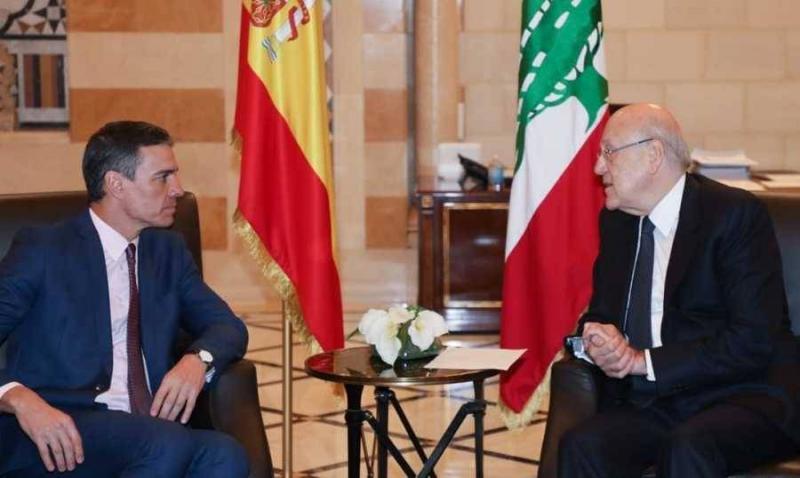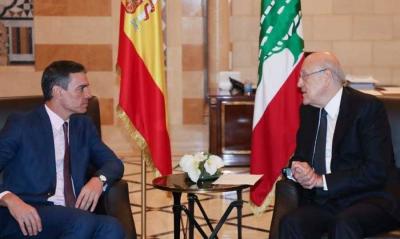Lebanon's Prime Minister Najib Mikati reiterated "Lebanon's commitment to all provisions of Resolution 1701 and its diligent efforts to implement them," emphasizing that "all security, military, and judicial authorities will not waver, even for a moment, in fulfilling their duties in identifying those who fired on the UNIFIL vehicle two weeks ago and bringing them to justice."
Spanish Prime Minister Pedro Sánchez affirmed "his country's commitment to supporting UNIFIL's work in southern Lebanon," noting that "the Spanish battalion is the largest contingent participating since 2006." He praised Lebanon for hosting Syrian refugees despite the crises it faces, and expressed understanding for Lebanon's insistence on the voluntary return of these individuals to their homeland.
The Lebanese and Spanish Prime Ministers held talks at the Grand Serail this evening as part of Sánchez's visit to Lebanon and his inspection of his country's battalion operating within the international forces in southern Lebanon. Sánchez arrived at the Grand Serail at 6 PM, where he was received by Prime Minister Mikati and welcomed by a guard of honor before they moved to the inner salon, where Mikati greeted the members of the Spanish delegation, which included Defense Minister Margarita Robles, Spain's Ambassador to Lebanon Jesús Ignacio Santos, and the Director of the Foreign Affairs Department in the Spanish Prime Minister's office, Emma Aparici.
The Spanish Prime Minister also greeted the Lebanese delegation, which included: Justice Minister Henry Khoury, Secretary-General of the Council of Ministers Judge Mahmoud Makiyeh, Mikati's advisors former minister Nicolas Nahas and Ambassador Petros Assaker, and Mr. Ziad Mikati. The two leaders held a private meeting followed by an expanded official discussion with the participation of members of both delegations. During the talks, Mikati welcomed his guest and said: "We welcome you and your accompanying delegation to Lebanon, and your visit is an additional confirmation of the international solidarity with Lebanon and the indispensable support for it to rise from its crisis."
Mikati continued to thank Spain for contributing a battalion of around 600 Spanish peacekeepers to the United Nations forces, which is, as I learned, the largest Spanish military presence abroad, demonstrating Spain's steadfast commitment to Lebanon's stability.
Mikati assured Sánchez that, as previously stated to UNIFIL commander General Lázaro, "all security, military, and judicial authorities will not hesitate, even for a moment, in fulfilling all their duties regarding identifying those who shot at the UNIFIL vehicle two weeks ago, resulting in the loss of an Irish peacekeeper's life and injuries to his comrades, and bringing them to justice for their actions. We bow to the enormous sacrifices made by international forces in the south, where the blood of its kind people mingles with the blood of these forces to establish security and peace throughout the homeland."
He added: "Allow me, Mr. President, to reiterate Lebanon's commitment to all provisions of Resolution 1701 and the thorough work towards their implementation. I take the opportunity of your presence today in Lebanon to reiterate what you have come to know: what exacerbates the intense economic crisis in Lebanon is the significant number of Syrian refugees and Palestinian refugees on Lebanese territory, and the repercussions of this presence on security, stability, and the economy. The impact of the COVID-19 pandemic, along with its accompanying public lockdowns that hindered production and economic cycles, has further intensified this crisis, and then came the devastating Beirut port explosion that obliterated all hopes for a rapid recovery."
He said: "With your support today, especially after your appreciated decision to add Lebanon to the list of priorities for international development and cooperation for the period 2022-2026, and the support of the international community, Lebanon will rise from its setbacks and regain its shine among nations. It is in dire need of its international friends, of whom you are at the forefront. Let us work together to revive the economic wheel in Lebanon and facilitate the return of Syrian refugees to their homeland, most of which is now secure and safe. Let us provide them with a safe and dignified, unconditional return, so they can participate in rebuilding their country while we continue to address our internal economic issues, which this influx has worsened."
He expressed confidence that Spain could provide substantial support in this respect and give priority to the Syrian refugee issue within the European Union during its presidency of the European Council in the second half of 2023, encouraging collaborative international efforts to ensure security, political, and social stability for Lebanon. He assured that the Lebanese government is committed to undertaking necessary reforms and actions to overcome the crisis and move towards the future.
In turn, the Spanish Prime Minister said: "I have come to Lebanon because it means a lot to us and is the first country that Spain supports from the Spanish support fund." He reaffirmed his country’s commitment to supporting UNIFIL's mission in southern Lebanon, highlighting that the Spanish battalion is the largest contingent participating since 2006. He pointed out that Spain will preside over the European Council next year, and a priority is to strengthen relations with neighboring countries, foremost of which is Lebanon, as well as enhancing relationships between Lebanon and the European Union in the fields of alternative energy, agriculture, infrastructure, and youth capability development. He acknowledged Lebanon’s reception of Syrian refugees, despite the ongoing crises, and assured that he would make efforts through the European Union to support Lebanon in this regard.
Following the Grand Serail visit, the Spanish Prime Minister headed to the seat of the second presidency in Ain el-Tineh, accompanied by Defense Minister Margarita Robles and in the presence of Spanish Ambassador to Lebanon Jesús Santos and the accompanying delegation, where they reviewed the general situation in Lebanon and the region and bilateral relations between Lebanon and Spain.
Parliament Speaker Nabih Berri praised the "visit of the Spanish Prime Minister and the accompanying delegation to Lebanon, especially at this stage," commending "Spain's role and support for Lebanon, particularly through its participation in the international peacekeeping forces in southern Lebanon," noting that "the historical relationship with these forces, which dates back more than four decades, has contributed to strengthening friendly ties and exchanging experiences across several domains, including cooperative programs in various fields."
The Speaker expressed his readiness to work towards developing cooperation between Lebanon and Spain, especially in the parliamentary and legislative aspects, emphasizing to the Spanish guest the necessity of completing the first constitutional duty represented by electing a president for the republic as a mandatory entry point for Lebanon to transition towards a solution and an exit from the current crisis.
The meeting also included a gift exchange. At the "Miguel de Cervantes" base, the Spanish Prime Minister visited his country's forces within the United Nations Interim Force in Lebanon (UNIFIL) during the Christmas holidays. After honoring him with a military parade, he visited the facilities of the base, where the unit members briefed him on the tasks and duties they perform. He concluded his visit with a meeting with officials from the Spanish unit before returning to Beirut.
A statement from UNIFIL noted that "the Spanish armed forces were first deployed in southern Lebanon with the United Nations Interim Force in Lebanon in September 2006, in compliance with Resolution 1701 issued on August 11, 2006, which was approved by the United Nations Security Council, with its primary aim being to ensure the cessation of hostilities between Lebanon and Israel, support the Lebanese army in asserting its authority in the region, and provide support to ensure the humanitarian assistance reaches civilian populations."
The multinational brigade in the eastern sector, led by Spain, comprises about 3,500 soldiers from nine different countries (Argentina, Brazil, El Salvador, Spain, India, Indonesia, Kazakhstan, Nepal, and Serbia). Spain contributes about 600 military personnel, most of whom are from the Commando Brigade, from the BRILIB XXXVIII battalion.




